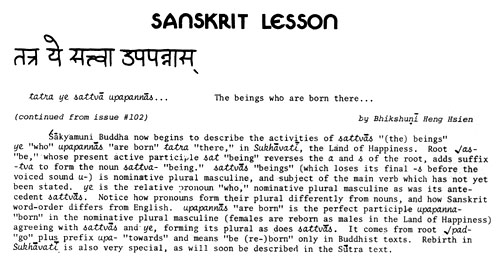Sakyamuni Buddha now begins to
describe the activities of sattvas "(the) beings"
ye, "who" upapannas
"are born" tatra "there," in Sukhavati, the
Land of Happiness. Root as- "be," whose present
active participle sat "being" reverses the a and
s of the
root, adds suffix -tva to form the noun
sattva-
"being." sattvas "beings" (which loses its
final -s before the voiced sound
u-) is nominative
plural masculine, and subject of the main verb which has not yet
been stated, ye is the relative
pronoun "who," nominative plural masculine as was its antecedent
sattvas. Notice
how pronouns form their plural differently from nouns, and how
Sanskrit word-order differs from English.
upapannas "are born" is the perfect participle upapanna-
"born" in the
nominative plural masculine (females are reborn as males in the Land
of Happiness) agreeing with sattvas
and ye,
forming its plural as does sattvas. It comes from root pad-
"go" plus prefix upa-
"towards" and means "be (re-)born" only in
Buddhist texts. Rebirth in Sukhavati is also very
special, as will soon be described in the Sutra text.
|

